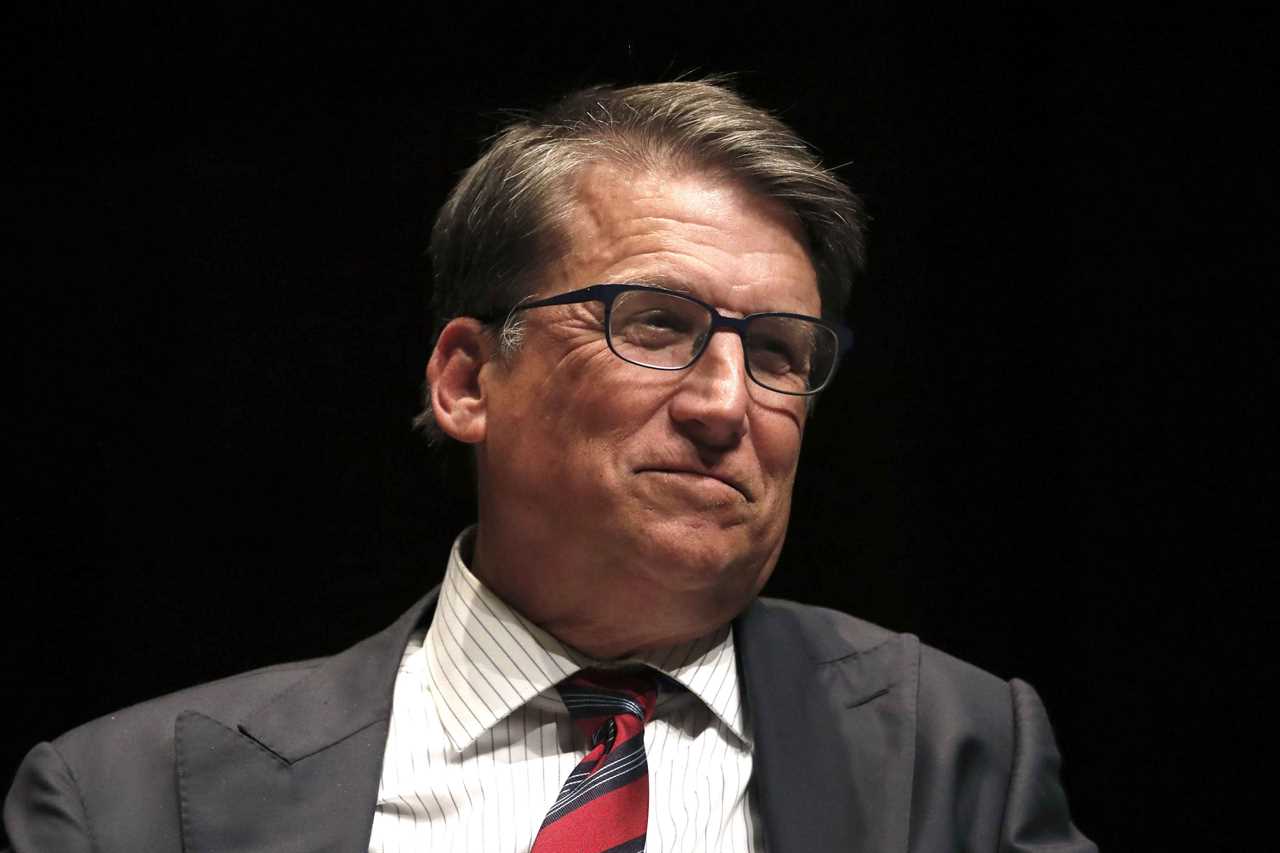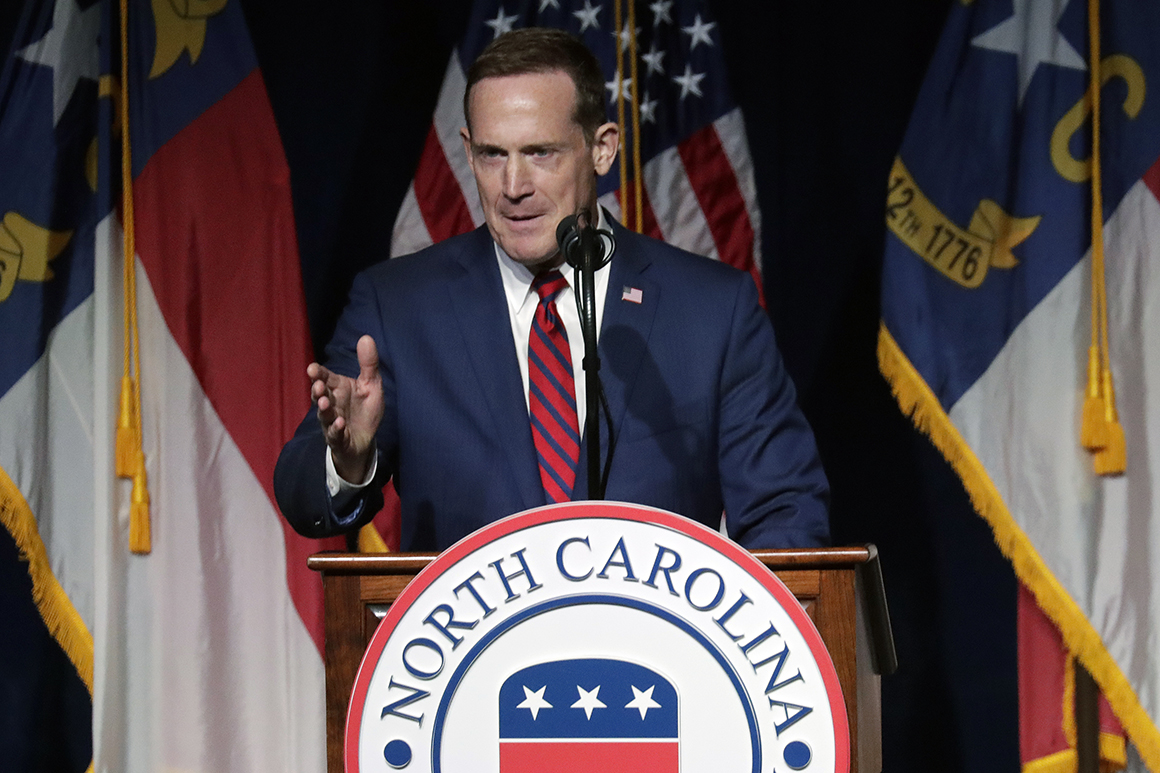
Backroom deal-making threatened to shake up North Carolina’s Republican Senate primary last week. Now, it’s given way to public brawling.
Negative attacks are ratcheting up in the fight for the open seat. A 12-page mailer landed in voters’ mailboxes this week calling former Gov. Pat McCrory “fatally flawed” and criticizing his ethics, while TV ads hammered him as a “Trump-hater, liberal faker” and attacked McCrory for endorsing Mitt Romney for president in 2012. They’re all paid for by the Club for Growth’s super PAC, part of a multimillion dollar effort to back Ted Budd (R-N.C.), who has received former President Donald Trump’s endorsement in the Senate race.
And McCrory, in his first interview since the ads started airing, went after the big-money group as Budd’s “bank,” intimating that Budd sold himself to the group “funding his entire political existence.”
“He’s standing on the backs of [a] Washington insiders’ group and endorsements with no record whatsoever,” McCrory said. “I don’t need to do that. I can stand on my record of accomplishments, kept promises as a mayor and as a governor. … My opponent’s vote may be for sale, but mine isn’t.”

The intensifying attacks come as the Republican field to succeed retiring GOP Sen. Richard Burr appeared to narrow in recent days. On Saturday, former Rep. Mark Walker got Trump’s word he would endorse Walker to run in a newly drawn congressional district if he exited the Senate race, a shift that was expected to serve as a boost for Budd.
But on Thursday, after days had passed without an official endorsement announcement from Trump, Walker said he will remain in the Senate race for now, and he will continue to consider a House run through the end of the year. The Associated Press first reported Walker’s latest thinking.
“We haven’t ruled out anything,” Walker said to POLITICO on Thursday. “But before we get out and say that we’re adamantly going this direction or that direction, we’re reviewing all those options.
“I respect President Trump. I have an incredible opportunity to work closely with him. Yet at the same time, we still have to make the best decision for what we believe is right,” Walker continued. “We hope that aligns with President Trump’s endorsement.”
In an email this week sent to close supporters, Walker wrote he is “certainly leaning in the direction of running for this new district,” noting the seniority he would have upon returning to Congress.
Walker’s deliberations aren’t the only thing hanging over the primary: The contest’s negative turn, heralded by the wave of new ads this week solely targeting McCrory, could leave the eventual GOP nominee bloodied and cash-poor ahead of the general election in a state Trump narrowly won twice.
Meanwhile, that fight just got longer. The state Supreme Court on Wednesday ordered North Carolina’s primaries delayed two months, from March 8 to May 17, as other courts consider cases challenging North Carolina’s congressional and legislative maps as illegal gerrymanders.
“It’s obviously going to be more expensive” now that the primary will be held in May, said Doug Heye, a longtime Republican strategist who worked on North Carolina races.
Walker acknowledged that the court ruling — which could eventually lead to a new congressional map — gave him some pause about announcing he is “running for something that may not even exist.”
But Trump’s endorsement of Budd and behind-the-scenes candidate maneuverings haven’t changed McCrory’s mind or his pitch about running for Senate. McCrory argues that he’s the best general election candidate to keep North Carolina’s Senate seat under GOP control, running on his record as a former governor and former mayor of Charlotte. McCrory’s campaign often points to his high name recognition, as well as his high favorability ratings, even as the Club for Growth started attacking him earlier this year. Burr, who hasn’t formally endorsed in the race, echoed that pitch of McCrory as the best general election candidate in June.
As for Trump’s endorsement, McCrory said that “when I go out and speak with groups, we aren’t really talking about that issue. People want to know what you plan to do as a U.S. senator,” he continued.
Instead, McCrory likened himself to Glenn Youngkin, the Republican governor-elect of Virginia, who won his November race by picking up moderate and independent voters in a state President Joe Biden won by 10 points, all while keeping Trump at arm’s length. McCrory described his approach as “probably more like the Virginia situation, where, again, I respect the Trump policies, except for deficit spending, but I’m running on my own record of accomplishment, my own vision for the future.”
One notable difference, of course, is that Youngkin had Trump’s endorsement.
McCrory does currently lead public and private polling in the GOP primary, but he’s facing a deluge of negative advertising on TV and in voters’ mailboxes. The Club for Growth, which in 2020 gave Budd a 99 percent on its congressional scorecard, has pledged to spend at least $10 million to support his campaign. So far, the group’s super PAC has spent $8.6 million on television ads in the state, including advance purchases of air time over the coming months, according to ad-tracking firm AdImpact.
“If Trump had not gotten into it, McCrory’s got near-universal name ID … and it would’ve been his to lose,” said one Republican operative in the state, who is not involved with any of the Senate campaigns and was granted anonymity to discuss the issue candidly. “But the longer primary will doom McCrory because Budd now has more time to spend money, build momentum, build name ID.”
Jonathan Felts, a senior adviser to Budd’s campaign, said it was “laughable and silly” for McCrory to suggest Budd is only relying on his Washington support to advance in the race.
“Unless you’re referring to Davie County when you say Ted is a ‘D.C. insider,’ you don’t know anything about Ted Budd and his character,” Felts said, referencing Budd’s county of residence.
Felts also lambasted McCrory’s Virginia comparison, insisting Budd in the analogy would play the role of Youngkin, a businessman and political newcomer. “If you had to ask me which one knows more about business and which one knows the challenge of signing the front of a paycheck to pay his staff a salary and create jobs and the challenge that involves, that’s Ted Budd,” Felts said.
“If you want to know which one is a career politician, much more of the Terry McAuliffe model, it’s Pat McCrory,” he added.
For its part, the Club for Growth called McCrory “a failed former governor with a record of serious ethical lapses and corruption allegations, supporting subsidies to communist China and more,” said David McIntosh, president of the Club for Growth, in a statement shared with POLITICO. “The fact is the race is tied and he’s blown a massive lead — the real question is how much longer does McCrory stay in the race.”
----------------------------------------
By: Elena Schneider and Natalie Allison
Title: ‘Trump-hater’ vs. ‘Washington insider’: N.C. Republicans squabble over Senate seat
Sourced From: www.politico.com/news/2021/12/10/north-carolina-senate-fight-524071
Published Date: Fri, 10 Dec 2021 04:30:49 EST






